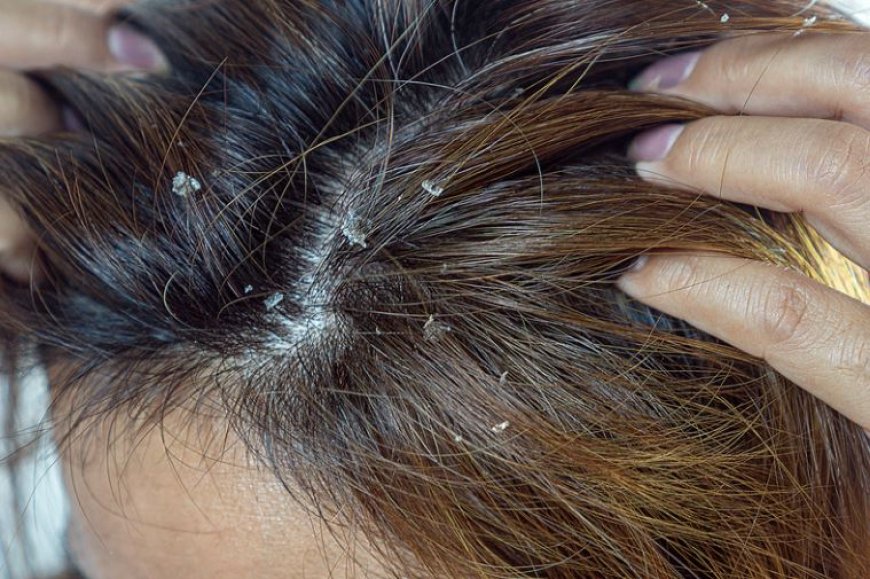Scalp Care 101: How to Prevent Dandruff & Promote Hair Growth Naturally
Struggling with dandruff or hair thinning? Discover expert scalp care tips to prevent flakes, promote hair growth, and maintain a healthy scalp naturally.

Introduction
A healthy scalp is the foundation of strong, beautiful hair. Yet, many people struggle with dandruff, itchiness, and slow hair growth, often not realizing that proper scalp care is the key to resolving these issues.
Whether you're dealing with flakes, excessive oil, or hair thinning, understanding the right scalp care routine can make all the difference. In this guide, we’ll explore why scalp health matters, how to prevent dandruff, and the best ways to promote hair growth naturally.
1. Why Scalp Health Matters for Hair Growth
Your scalp is like soil—when it’s healthy, your hair thrives. When neglected, it can lead to dandruff, clogged follicles, and hair loss. Here’s why scalp care should be a priority:
- Encourages Stronger Hair Growth – A clean, nourished scalp provides the perfect environment for hair follicles to grow thicker and healthier strands.
- Prevents Dandruff & Dryness – Hydration and exfoliation keep the scalp balanced and flake-free.
- Reduces Hair Fall – A healthy scalp strengthens hair at the root, preventing excessive shedding.
Read more on the importance of scalp health from the American Academy of Dermatology.
2. What Causes Dandruff?
Dandruff is one of the most common scalp issues, affecting nearly 50% of people worldwide. It occurs when the scalp sheds dead skin cells faster than normal, leading to visible flakes and irritation.
Common Causes of Dandruff:
- Dry Scalp – Lack of moisture can cause flaking, especially in cold weather.
- Oily Scalp & Seborrheic Dermatitis – Excess oil and yeast growth (Malassezia) can lead to greasy dandruff.
- Product Buildup – Overusing styling products clogs follicles, causing irritation.
- Fungal Infections – Certain fungi thrive on the scalp, triggering dandruff.
- Poor Diet & Stress – Deficiencies in zinc and vitamin B, along with stress, can worsen dandruff.
Learn more about dandruff causes from the Mayo Clinic.
3. How to Prevent Dandruff Naturally
Instead of relying on harsh anti-dandruff shampoos, try these natural remedies to maintain a healthy, flake-free scalp.
1. Use a Gentle, Sulfate-Free Shampoo
Harsh shampoos strip the scalp’s natural oils, making dandruff worse. Opt for a sulfate-free shampoo with zinc pyrithione, salicylic acid, or tea tree oil to control flakes gently.
Recommended Shampoos:
2. Exfoliate Your Scalp Weekly
Just like your skin, your scalp benefits from exfoliation to remove dead skin cells and product buildup.
DIY Scalp Scrub Recipe:
- 2 tbsp brown sugar
- 1 tbsp coconut oil
- 5 drops of tea tree oil
Massage this scrub onto your scalp for 2–3 minutes before shampooing.
3. Keep Your Scalp Hydrated
If your scalp is dry, hydrate it with aloe vera gel or coconut oil before washing your hair. Aloe vera has anti-inflammatory properties that soothe irritation.
Discover more natural hydration techniques at Harvard Health.
4. Try an Apple Cider Vinegar Rinse
Apple cider vinegar (ACV) balances the scalp’s pH and has antifungal properties that reduce dandruff and itchiness.
How to Use ACV for Dandruff:
- Mix 1 part ACV with 2 parts water.
- Pour it over your scalp after shampooing.
- Let it sit for 5 minutes, then rinse.
5. Use Essential Oils for Scalp Care
Certain essential oils help combat dandruff and promote scalp health.
- Tea Tree Oil – Kills dandruff-causing fungus.
- Peppermint Oil – Soothes irritation and stimulates circulation.
- Rosemary Oil – Improves blood flow to hair follicles.
Check out the benefits of essential oils for hair on WebMD.
4. How to Promote Hair Growth Naturally
Dandruff can weaken hair roots and slow growth. Here’s how to strengthen your hair follicles and encourage faster growth.
1. Massage Your Scalp Daily
Scalp massages increase blood circulation, delivering nutrients to hair follicles and promoting growth.
How to Do It:
- Use your fingertips or a scalp massager.
- Apply light pressure in circular motions for 5–10 minutes daily.
- Combine with a few drops of rosemary or castor oil for better results.
2. Eat a Hair-Healthy Diet
Nutrient deficiencies often contribute to hair thinning and slow growth.
Best Foods for Hair Growth:
- Protein: Eggs, fish, lean meats.
- Biotin: Nuts, avocados, sweet potatoes.
- Iron & Zinc: Spinach, lentils, pumpkin seeds.
- Omega-3s: Salmon, walnuts, flaxseeds.
Read more about hair-nourishing foods from Cleveland Clinic.
3. Avoid Harsh Hair Products
Stay away from:
- Sulfates & parabens
- Alcohol-based styling products
- Frequent heat styling
Opt for natural, chemical-free products to prevent scalp irritation.
4. Keep Your Scalp Clean, But Don’t Overwash
Washing too often strips natural oils, while infrequent washing leads to buildup and clogged follicles. Wash 2–3 times a week with a mild shampoo.
5. Protect Your Scalp from Sun Damage
UV rays can dry out the scalp and weaken hair roots. Wear a hat or use a UV-protectant hair spray when outdoors.
Check out scalp sun protection tips from the Skin Cancer Foundation.
Conclusion
Scalp health plays a crucial role in preventing dandruff and boosting hair growth. By following a consistent routine that includes gentle cleansing, hydration, exfoliation, and a nutrient-rich diet, you can maintain a flake-free scalp and support strong, healthy hair growth.
Whether you’re dealing with persistent dandruff or hair thinning, these dermatologist-approved natural remedies will help you achieve a healthier scalp and gorgeous hair over time.
What's Your Reaction?
 Like
0
Like
0
 Dislike
0
Dislike
0
 Love
0
Love
0
 Funny
0
Funny
0
 Angry
0
Angry
0
 Sad
0
Sad
0
 Wow
0
Wow
0



















































